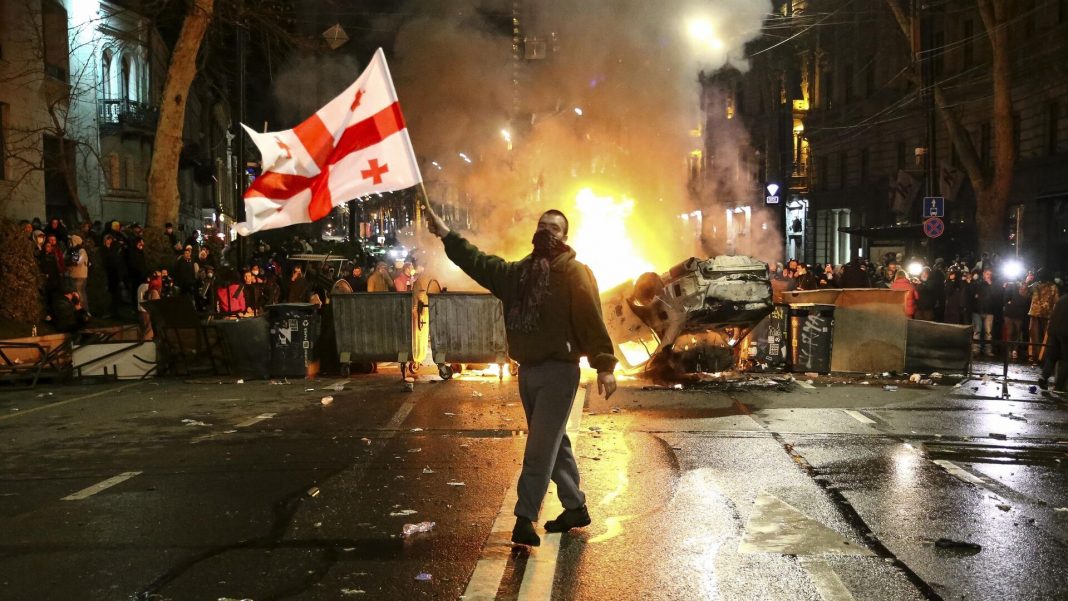In early April 2024, opposition protests began in Georgia against the current government’s intentions to adopt the Law on Foreign Agents. The ruling Georgian Dream party already tried to pass this law last March. Then mass protests began in Tbilisi, accompanied by violent clashes with the police. Western capitals also condemned the authorities’ intentions to adopt the law. As a result, the initiative was withdrawn. In 2024, the leaders of the Georgian Dream party (especially Prime Minister Irakli Kobakhidze, who replaced the more moderate Irakli Garibashvili) decided to resume preparations for the adoption of the law.
In this piece Ascolta analyzes domestic political developments in Georgia against the background of the adoption of the so-called law “on foreign agents” by the Parliament of the country, as well as possible scenarios of further developments ahead of the parliamentary and presidential elections.
This Content Is Only For Subscribers
Mamuka Mdinaradze, executive secretary of the Georgian Dream, announced on April 3 that the ruling party is ready to return to the consideration of the law on “foreign agents”. According to him, the name of the law will remain the same – “On Transparency of Foreign Influence”, but the key term will be changed. Instead of the term “agent of foreign influence” the phrase “an organization that pursues the interests of external forces” will be used. Mdinaradze stressed that the law will concern only organizations, not individuals. According to the bill, organizations financed from abroad by more than 20% will be obliged to submit a declaration on income and spending of funds to state authorities once a year. Otherwise, financial sanctions will be imposed on them.
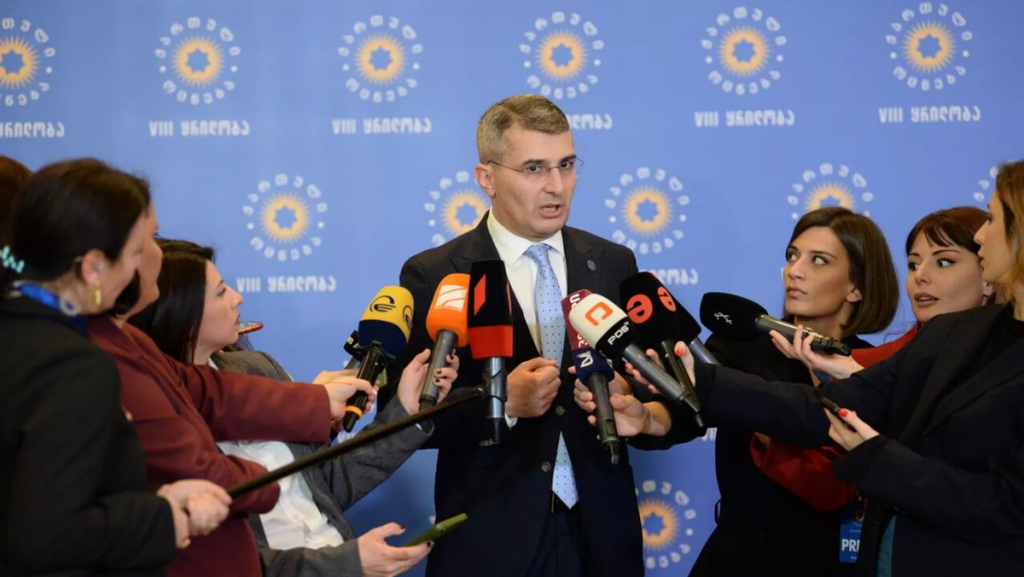
Mamuka Mdinaradze substantiated in detail the necessity of adopting this law. According to him, “90% of NGO funding in the country remains non-transparent”, and all attempts of the authorities “to achieve transparency from donors have come to nothing”. Moreover, the politician claims, donors “have not even responded to letters from top officials lately”. At the same time, “rich NGOs” “have been constantly trying to implement a revolutionary scenario in the country” and last summer, after the EU refused to grant Georgia candidate status, “demanded the resignation of the government and staffing of the interim technical government with representatives of NGOs”. The ruling party’s commentary published by Georgian media essentially accuses the NGOs of trying to drag Georgia into the Russian-Ukrainian confrontation. “They actively participated in all the protests held in 2022, the main demand of which was to join the sanctions and send volunteers to fight in Ukraine… Today it is clear to everyone what results we would bring to our country if we acted according to their dictates and their calls for war,” the parliamentary majority said in a statement.
The Georgian Dream functionary named the American National Endowment for Democracy and the European Endowment for Democracy as the main sponsors of the Georgian “war party” and “extremist forces” (for example, both foundations are recognized as undesirable organizations in Russia). According to Mamuka Mdinaradze, Georgians can no longer “be dependent on the goodwill of Western ambassadors”, while “NGOs together with opposition parties remain the main source of radicalism and polarization”. The politician called the situation in the country “the calm before the storm,” referring to the approaching parliamentary elections scheduled for October 26 this year.
The Georgian opposition has called on citizens to mobilize to prevent the parliament from adopting a new version of the law on foreign agents. The fact that the authorities intend to bring what they have started to the end was announced by the executive secretary of the GD Mamuka Mdinaradze. “I appeal to everyone, including women, who make up the majority of the population of this country, to the youth, to all the people who were with us last March, we must all do our best together to prevent the Georgian Dream from turning our country back,” Khatia Dekanoidze, a member of the opposition parliamentary group Eurooptimists, said on April 3.
Ana Tsitlidze from the opposition United National Movement party (supporters of former President Mikheil Saakashvili) stated that the current government and the European integration of Georgia are “incompatible with each other”: “Ivanishvili’s party is still doing a lot of damage to the European course of this country, and it is the duty of each of us, as before, to fight to the end so that this Russian law is not passed by the parliament.”
There was even a fight between Georgian Dream MPs and the leader of the opposition Citizens party Aleko Elisashvili in the plenary session hall of the parliament. The oppositionist called on fellow citizens to “take to the streets and prevent the adoption of the law”. The leader of the United National Movement party Levan Khabeishvili is sure that “the ruling party knows that it is losing the elections and is going all-in”. The head of the opposition party “Lelo” Mamuka Khazaradze expressed confidence that Bidzina Ivanishvili and his party received a direct order from the Kremlin to pass the scandalous law.

The Georgian opposition is sure that this time the authorities intend to go to the end and are determined to suppress attempts of opposition forces to oppose the adoption of the law.
But in April, opponents of the Georgian Dream were convinced that the authorities would be cunning and would not go for a frontal attack. Nika Gvaramia, founder of the Akhali party, suggested that the law would be passed in June. According to him, the authorities will wait until the beginning of the European Football Championship, when the whole country will be watching the performance of the Georgian national team and Georgians will have no time for protests. But the authorities did not hesitate. They put the draft law up for voting in the first reading already on April 15. This caused the first wave of confrontation – there was even a fight between pro-governmental and opposition MPs in the parliament. On the same day, protesters started clashes with law enforcement forces. The first detentions also started.
On April 17, the bill was adopted in the first reading. The very fact that the bill was passed was met with outrage from the opposition. Georgian President Salome Zurabishvili promised that she would veto the law if it was passed. But the obvious fact is that the “Georgian Dream” has every opportunity to override the veto.
U.S. Ambassador to Georgia Robin Dunnigan met with the Georgian leadership several times in an attempt to stop the consideration of the draft law. British Ambassador Mark Clayton also met with the Georgian Prime Minister, demanding a suspension of the process of consideration of the law on foreign agents. Kobakhidze refused. Moreover, on May 3 Kobakhidze canceled his working visit to the United States. On May 13, U.S. Assistant Secretary of State for European and Eurasian Affairs James O’Brien arrived in Georgia and offered to meet with informal Georgian Dream leader Bidzina Ivanishvili. In response, Ivanishvili refused the meeting, which caused a storm of indignation in the United States.
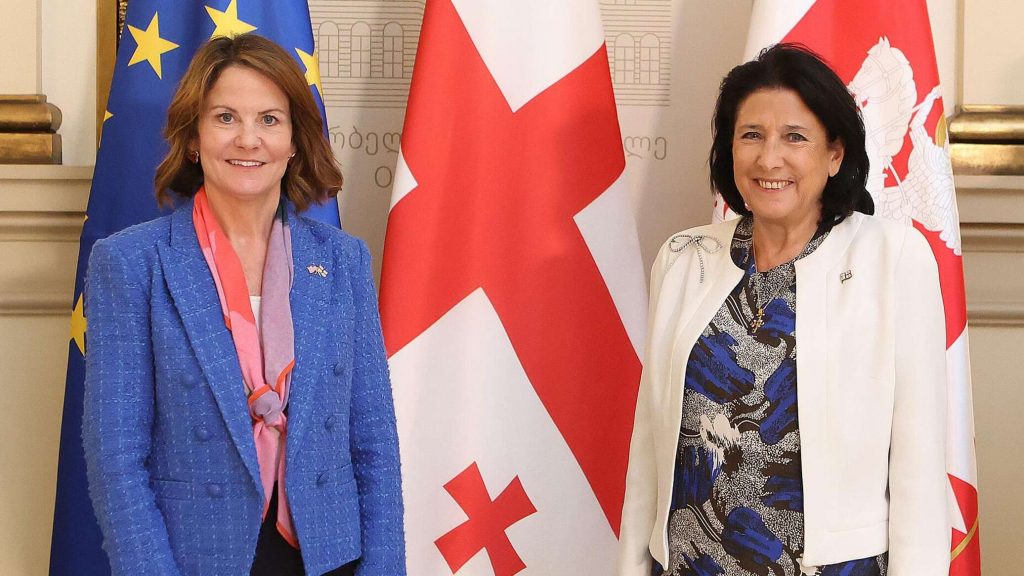
Under pressure from the United States (which adopted a similar law back in 1938), a number of countries have refused to consider laws on foreign agents. Thus, in 2016, Ukraine refused to consider such a law. U.S. Ambassador to Kazakhstan Daniel Rosenblum succeeded in getting President Kasym-Jomart Tokayev to remove the foreign agents bill from the ballot. Kyrgyzstan, on the other hand, passed a similar law. However, President Sadyr Zhaparov claimed that more than thirty foreign leaders plus all sorts of international human rights organizations pressured him to drop it.. U.S. Secretary of State Anthony Blinken personally wrote a letter with veiled threats. The Kyrgyz leader refused the U.S., and attempts to organize protests in the republic were stopped by Kamchibek Tashiev, chairman of the GKNB, having neutralized in advance all those who could raise a popular wave.
On May 1, the bill was passed in the second reading. On the night before the voting day, protesters against the “law on foreign agents” attempted to block the exits of the legislative building in order to organize “corridors of shame” for Georgian Dream deputies. However, riot police pushed the activists from side streets to the central Shota Rustaveli Avenue. The police used pepper and tear gas, as well as rubber bullets to squeeze out the protesters. Water cannons and other means of dispersing the demonstrators were used. The leader of the Georgian National Unity party, Levan Khabeishvili, had two teeth knocked out and his nose broken. As a result of the clashes, six police officers were injured and 63 people were detained, according to the Georgian Interior Ministry. Georgian President Salome Zurabishvili spoke in defense of the protesters, calling on Interior Minister Vakhtang Gomelauri to stop the crackdown. “Completely unjustified, unprovoked and disproportionate use of force….. Full responsibility falls on the government. The Georgian people have been deprived of the right to peaceful protest,” the politician said.
On April 29, the authorities also held a rally in support of the law. At the rally, Bidzina Ivanishvili actually announced the country’s rejection of the course of European integration. In his opinion, the “global war party” (the collective West) tried to undermine the sovereignty of Georgia, but thanks to the law on foreign agents the Georgian authorities will be able to defend the country’s right to independence and preservation of traditional values. Ivanishvili said that in 2004-2012 under Mikheil Saakashvili “Georgia was ruled by foreign agents” who came to power as a result of the 2003 Rose Revolution. According to Ivanishvili, Mikheil Saakashvili came to power “with the help of NGOs”, and since it is impossible to allow “appointment of power in Georgia from outside”, it is necessary to adopt the draft law “On Transparency of Foreign Influence”.
According to Ivanishvili, it is the “global war party” that is to blame for conflicts and instability in the region. In particular, these forces “confronted Georgia with Russia in 2008” and then “plunged Ukraine into an even worse state”, trying to “open a second front against Russia in Georgia”. If the agents “return to power,” the “global war party” will be able to “open a second front”.
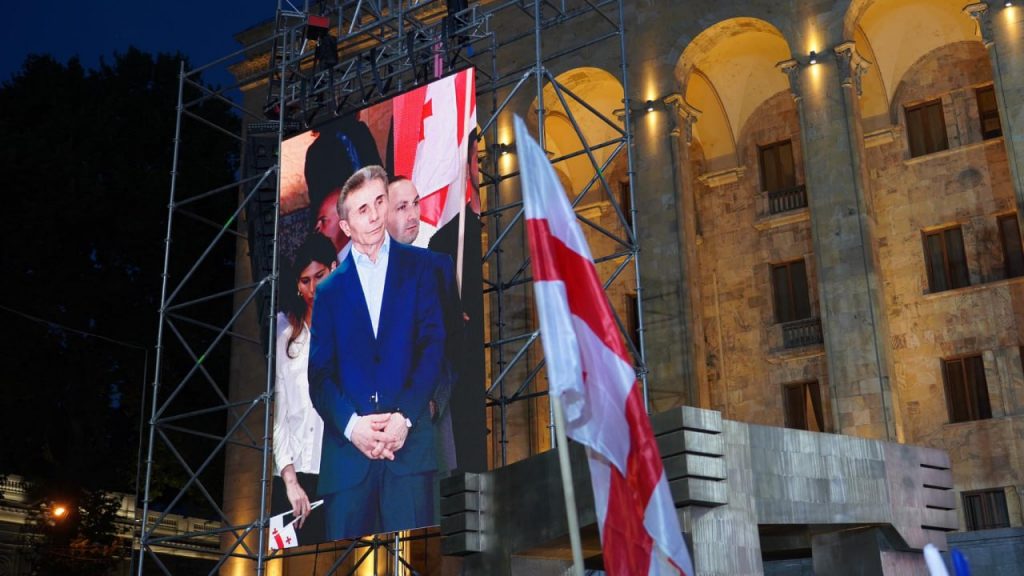
“Today’s Georgia is not the Georgia of Shevardnadze’s time or Yanukovych’s Ukraine,” the country’s shadow leader assured and regretted that he “did not punish the UNM as a criminal organization” when he came to power in 2012. But Mr. Ivanishvili promised to outlaw “Saakashvili’s party” immediately after the parliamentary elections scheduled for October.
The jailed Mikheil Saakashvili issued a statement urging supporters to continue rallies in the “most radical and intransigent style possible” because “it is not possible to quibble with such authorities.”
As Prime Minister Irakli Kobakhidze said on May 1, the protests are just “a few days of discomfort”. According to him, the authorities are ready for the rallies, which will go on until the day when the GM is going to override President Salome Zurabishvili’s veto of the bill. “However, in the long run, we will insure this country against polarization and radicalism for years,” Kobakhidze assured.
On 8 May, the Georgian State Security Service said that the organizers of rallies against the draft law on foreign agents in Georgia were preparing provocations involving volunteers fighting in Ukraine. The goal of the provocations was described as “the development of destructive and violent scenarios”. The SGB assured that these actions are “financed from abroad by specific political parliamentary and non-parliamentary parties and non-governmental organizations.” “The said criminal plans involve Georgian citizens abroad, in particular a certain part of Georgians fighting in Ukraine.” According to the security service, the protesters in Tbilisi are using methods of “color revolutions.” The organizers of the protests receive money from abroad in the form of cryptocurrency, the SGB claims. The opposition plans to paralyze transportation hubs and block administrative buildings, the agency warned. Unofficial sources said that the ruling party is ready to take radical measures against its opponents if they try to carry out their plans.
Prime Minister Kobakhidze also claimed that the West was trying to drag Georgia into the Russian-Ukrainian war and open a “second front” of war on Georgian territory; his rhetoric was described as “anti-European” and “anti-American”. In February 2024, when Georgia’s State Security Service announced the discovery of Ukrainian explosives on Georgian territory, Kobakhidze repeated his claims that Georgia was being dragged into the war: “This once again confirms what in principle high-ranking officials of the Ukrainian government have openly stated that they want and probably still want: a second front in our country”.
The Mayor of Tbilisi Kakha Kaladze (former soccer player and Secretary General of the ruling Georgian Dream party) reacted very harshly to the West’s interference and the arrival of the foreign ministers of Iceland, Latvia and Estonia to Georgia, saying: “This is not friendship, this is enmity, this is an attempt to deepen polarization in the country. How can you imagine that our foreign minister, conditionally, would go to Yerevan and speak at an opposition rally? What kind of attitude is this? Is this friendship?”.

A new wave of opposition protests took place on May 13, when up to 100 thousand protesters managed to take to the streets of Tbilisi. But after that the protests went down. Ascolta sources note that Georgian security services managed to identify ways of financing the opposition. These are mainly funds that came from Great Britain and Malta (it was noteworthy that at the end of 2023 British and Maltese firms were among the main investors in the Georgian economy, investing mainly in the insurance business, consulting and IT-companies). Security and fiscal authorities have started checking those firms that have received investments from Europe and the United States over the past six months.
On April 18, President Zurabishvili vetoed the adopted law on foreign agents, but Georgian Dream has enough votes to override the veto. Obviously, a new wave of opposition protests should be expected on the eve of the vote for the attempt to override the veto (it is not excluded that the opposition will be pushed to a forceful scenario of the situation, which will be favorable to the authorities – it will give an excuse to ban the United National Movement.
It is striking that the protests in Georgia have a lot in common with the Ukrainian revolution of 2014. The same slogans, the same style: pots on the heads of protesters, appeal to European values, the arrival of “Western politicians”, the stage, the “beating of babies” on May 1, which served as a catalyst for the processes, pianos on the barricades, national symbols on the faces of young people, graffiti, the performance of the “EU anthem” – Beethoven’s Ode to Joy – over Rustaveli Avenue, and so on. At the same time, the example of Belarus, Venezuela, Hong Kong and other unsuccessful attempts to undermine the situation shows that the old Gene Sharp techniques do not work anymore. It is quite possible that the West is preparing a different strategy, putting to sleep the vigilance of the Georgian Dream, which is preparing for a new round of “color revolution”. Instead, they will be confronted with the fact of a new strategy. Otherwise, the opposition protests in Georgia are doomed.
When considering the nature of the Georgian “anti-Maidan” and the actions of the Georgian authorities, many people mistakenly look for a Russian trace. However, a deeper analysis of political processes in Georgia demonstrates that Ivanishvili and his party are not so much “agents of the Kremlin” as “agents of Beijing. The West is concerned about the fact that Georgia is getting closer and closer to China. Especially since the relations between China and Georgia are consistently developing. Over the past 10 years, the trade turnover has tripled: if in 2012 the volume of mutual trade amounted to $640 million, in 2022 it reached $1.8 billion. China is steadily one of the five main trade partners of Georgia, and more than 200 companies with Chinese capital operate in the republic.
Beijing is implementing a number of major infrastructure projects. In particular, a special economic zone Hualing Tbilisi Sea New City has been created in the north of Tbilisi, the Khador hydroelectric power plant has been built in the Pankisi Gorge, and the Kvesheti – Kobi highway is under construction.
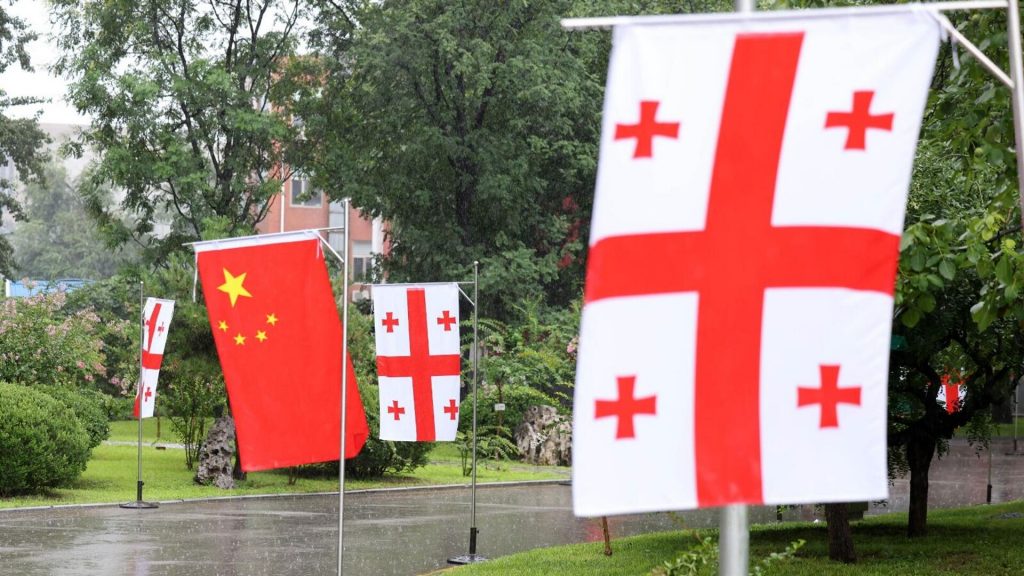
In addition, Georgia seeks to join the Middle Corridor project, a transportation route that would bring Chinese goods to Europe. For this purpose, the republic is modernizing its section of the Baku-Tbilisi-Kars railroad and building a deep-water port of Anaklia on the Black Sea. In the summer of 2023, Georgia, Kazakhstan and Azerbaijan signed a joint logistics development plan and agreed to simplify transit rules.
Relations are also developing at the political level. In 2015, the Transcaucasian republic was one of the first countries to join the One Belt, One Road initiative, signing the relevant memorandum. In 2017, Beijing and Tbilisi agreed to establish a free trade zone, thanks to which Georgian producers began to supply their goods to China without customs duties, with zero tariffs.
In the summer of 2023, Georgian Prime Minister Irakli Garibashvili paid a working visit to China. During the visit, an agreement on strategic partnership between the two countries was signed. The head of the Georgian government also expressed readiness to support various global Chinese projects, including the “One Belt, One Road” project. In an interview following the visit, Garibashvili called Chinese President Xi Jinping an exemplary leader and his policies impressive.
Western countries do not hide their discontent. U.S. Ambassador to Georgia Robin Dunnigan called the rapprochement between Tbilisi and Beijing undesirable. According to her, Washington sincerely respects the sovereignty and territorial integrity of the Transcaucasian republic, while China allegedly has a different approach. The European Union also criticized Tbilisi. “Everyone is trying to become more economically independent from China, but Georgia is moving in a different direction,” MEP Viola von Kramon noted.
It is clearly in the U.S. interest today to prevent the construction of the Trans-Caspian International Transport Route (TMTM or Middle Corridor), which could become an effective alternative to East-West transport corridors. The TMTM runs from China through Kazakhstan, the Caspian Sea, Azerbaijan, Georgia, Turkey and on to Europe.
In this regard, Chinese Ambassador to Georgia Zhou Jian is becoming one of the main lobbyists for Chinese interests in the region. He has already stated that China is interested in infrastructure projects in the countries of the Middle Corridor and named the Anaklia deep-water port among them. Speaking to the media after a conference organized by the Chinese Embassy in Tbilisi on September 6, 2023, he stressed the importance of the Belt and Road Initiative and the Middle Corridor region.
Georgia will hold parliamentary elections in October 2024. The victory of pro-Western forces threatens China’s plans in the region. That is why today the law on foreign agents is becoming a catalyst for those forces that act as essentially anti-Chinese. And that’s why the stakes are being raised. The West will fuel the protest mood. The government’s task is to block the opposition’s accounts and organizational capabilities, and possibly to get opposition parties and a number of NGOs banned.
In this context, it can be assumed that the main problem for Ivanishvili and his associates is President Zurabishvili. Presidential elections are to be held in October. According to the Georgian Constitution, the president is elected by an electoral college of 300 people, 150 of whom are members of parliament and 150 are representatives of the regions. Zurabishvili wants to use opposition sentiment to gain a margin in favor of her candidacy – mainly at the expense of electors from the regions. Zurabishvili also has French and (according to some reports) American citizenship and is trying to play on the side of the West and lobby for Western interests.
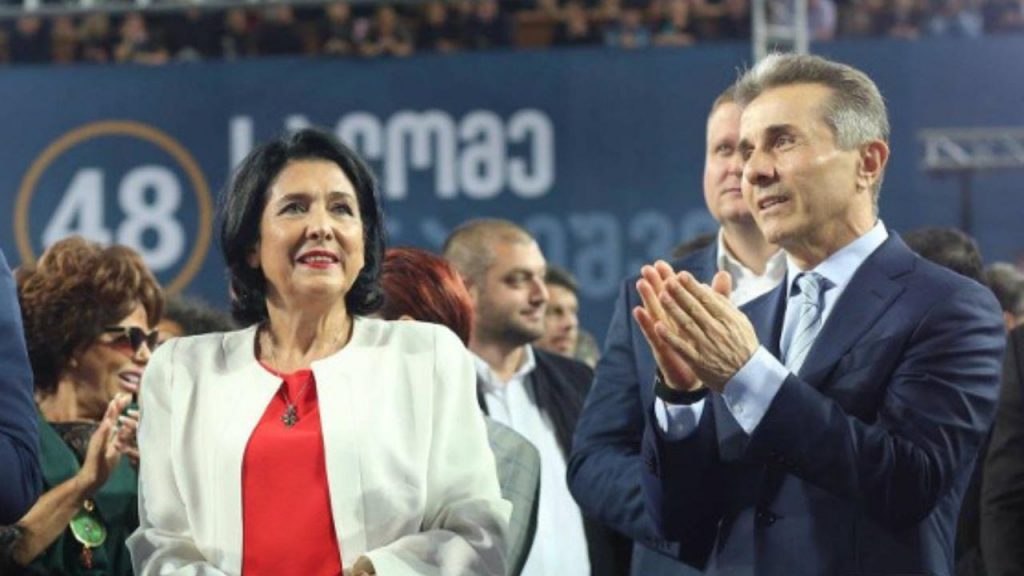
In general, it can be assumed that the protests in Georgia are a de facto shake-up of the situation before the presidential and parliamentary elections.
Interestingly, in parallel with the Georgian protests, protest sentiments are noticeably intensifying in a number of Central Asian states: Kazakhstan, Uzbekistan and Turkmenistan. Local politicians often like to blame Western intelligence services for such escalation attempts, which, according to them, regularly carry out such work.
At the same time, it is important to note that Uzbekistan has already provoked a conflict at the elite level, which may soon escalate into an open clash of political groups. In Kazakhstan, according to Kazakhstani special services, Western states and foundations are sponsoring unceasing protests among oil workers in the Mangistau region. Just the other day, President Tokayev was informed that intelligence services had uncovered preparations for a new “color revolution.” As a result of the investigation, the head of the Mangistau Oblast Police Department, Ayan Duisembayev, Oblast Prosecutor Rufat Kuttukov, and the head of the oblast’s DCNB, Bakhytzhan Valeniyazov, were dismissed on May 15. Following them, the regional akim Nurlan Nogaev was deprived of his post. The question of their connections with Western forces is under consideration. That is, these processes are a direct echo of the events that took place in Georgia and aimed at preventing the construction of the TMTM.

